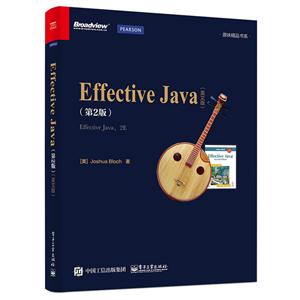扫一扫
关注中图网
官方微博
本类五星书更多>
-
>
决战行测5000题(言语理解与表达)
-
>
软件性能测试.分析与调优实践之路
-
>
第一行代码Android
-
>
深度学习
-
>
Unreal Engine 4蓝图完全学习教程
-
>
深入理解计算机系统-原书第3版
-
>
Word/Excel PPT 2013办公应用从入门到精通-(附赠1DVD.含语音视频教学+办公模板+PDF电子书)
买过本商品的人还买了
刑法的私塾-(之二)-(上.下)
¥62.7¥98.0现代操作系统-原书第4版
¥38.3¥89.0深入理解计算机系统-原书第3版
¥90.4¥139.0Java核心技术-基础知识-卷1-(原书第10版)
¥65.5¥119.0垃圾回收的算法与实现
¥47.5¥99.0
Effective Java-(第2版)-(英文版) 版权信息
- ISBN:9787121273148
- 条形码:9787121273148 ; 978-7-121-27314-8
- 装帧:暂无
- 册数:暂无
- 重量:暂无
- 所属分类:>>
Effective Java-(第2版)-(英文版) 本书特色
本书通过78个有效案例,旨在帮助读者深入理解java,以写出更加清楚、健壮、可重复使用的代码。书中每个章节均包含小论文,针对java平台和杰出的代码样例,提供了具体的分析和建议,这些综合的描述和解释为程序员们明确指出了做什么、不做什么以及为什么这样。
Effective Java-(第2版)-(英文版) 内容简介
本书通过78个有效案例,旨在帮助读者深入理解Java,以写出更加清楚、健壮、可重复使用的代码。书中每个章节均包含小论文,针对Java平台和杰出的代码样例,提供了具体的分析和建议,这些综合的描述和解释为程序员们明确指出了做什么、不做什么以及为什么这样。
Effective Java-(第2版)-(英文版) 目录
推荐序前言1 introduction2 creating and destroying objectsitem 1: consider static factory methods instead of constructorsitem 2: consider a builder when faced with many constructor parameters item 3: enforce the singleton property with a private constructor or an enum type item 4: enforce noninstantiability with a private constructor item 5: avoid creating unnecessary objects item 6: eliminate obsolete object referencesitem 7: avoid finalizers3 methods common to all objectsitem 8: obey the general contract when overriding equals item 9: always override hashcode when you override equals item 10: always override tostring item 11: override clone judiciouslyitem 12: consider implementing comparable 4 classes and interfacesitem 13: minimize the accessibility of classes and membersitem 14: in public classes, use accessor methods, not public fields item 15: minimize mutabilityitem 16: favor composition over inheritanceitem 17: design and document for inheritance or else prohibit it item 18: prefer interfaces to abstract classes item 19: use interfaces only to define typesitem 20: prefer class hierarchies to tagged classesitem 21: use function objects to represent strategies item 22: favor static member classes over nonstatic 5 generics item 23: don’t use raw types in new code item 24: eliminate unchecked warningsitem 25: prefer lists to arrays item 26: favor generic typesitem 27: favor generic methods item 28: use bounded wildcards to increase api flexibility item 29: consider typesafe heterogeneous containers 6 enums and annotations item 30: use enums instead of int constantsitem 31: use instance fields instead of ordinals item 32: use enumset instead of bit fieldsitem 33: use enummap instead of ordinal indexingitem 34: emulate extensible enums with interfaces item 35: prefer annotations to naming patterns item 36: consistently use the override annotationitem 37: use marker interfaces to define types 7 methods item 38: check parameters for validity item 39: make defensive copies when needed item 40: design method signatures carefullyitem 41: use overloading judiciouslyitem 42: use varargs judiciouslyitem 43: return empty arrays or collections, not nulls item 44: write doc comments for all exposed api elements 8 general programming item 45: minimize the scope of local variablesitem 46: prefer for-each loops to traditional for loopsitem 47: know and use the libraries item 48: avoid float and double if exact answers are required item 49: prefer primitive types to boxed primitives item 50: avoid strings where other types are more appropriate item 51: beware the performance of string concatenation item 52: refer to objects by their interfaces item 53: prefer interfaces to reflection item 54: use native methods judiciouslyitem 55: optimize judiciously item 56: adhere to generally accepted naming conventions9 exceptions item 57: use exceptions only for exceptional conditions item 58: use checked exceptions for recoverable conditions and runtime exceptions for programming errorsitem 59: avoid unnecessary use of checked exceptions item 60: favor the use of standard exceptionsitem 61: throw exceptions appropriate to the abstractionitem 62: document all exceptions thrown by each methoditem 63: include failure-capture information in detail messages item 64: strive for failure atomicity item 65: don’t ignore exceptions 10 concurrencyitem 66: synchronize access to shared mutable dataitem 67: avoid excessive synchronization item 68: prefer executors and tasks to threadsitem 69: prefer concurrency utilities to wait and notify item 70: document thread safety item 71: use lazy initialization judiciously item 72: don’t depend on the thread scheduler item 73: avoid thread groups11 serializationitem 74: implement serializable judiciouslyitem 75: consider using a custom serialized form item 76: write readobject methods defensively item 77: for instance control, prefer enum types to readresolve item 78: consider serialization proxies instead of seri
展开全部
书友推荐
- >
随园食单
随园食单
¥15.4¥48.0 - >
新文学天穹两巨星--鲁迅与胡适/红烛学术丛书(红烛学术丛书)
新文学天穹两巨星--鲁迅与胡适/红烛学术丛书(红烛学术丛书)
¥9.9¥23.0 - >
罗庸西南联大授课录
罗庸西南联大授课录
¥13.8¥32.0 - >
罗曼·罗兰读书随笔-精装
罗曼·罗兰读书随笔-精装
¥20.3¥58.0 - >
烟与镜
烟与镜
¥14.4¥48.0 - >
上帝之肋:男人的真实旅程
上帝之肋:男人的真实旅程
¥19.3¥35.0 - >
月亮与六便士
月亮与六便士
¥15.1¥42.0 - >
名家带你读鲁迅:故事新编
名家带你读鲁迅:故事新编
¥13.0¥26.0
本类畅销
-
4.23文创礼盒A款--“作家言我精神状态”
¥42.3¥206 -
4.23文创礼盒B款--“作家言我精神状态”
¥42.3¥206 -
一句顶一万句 (印签版)
¥40.4¥68 -
百年书评史散论
¥14.9¥38 -
1980年代:小说六记
¥52.8¥69 -
中图网经典初版本封面-“老人与海”冰箱贴
¥20¥40




















